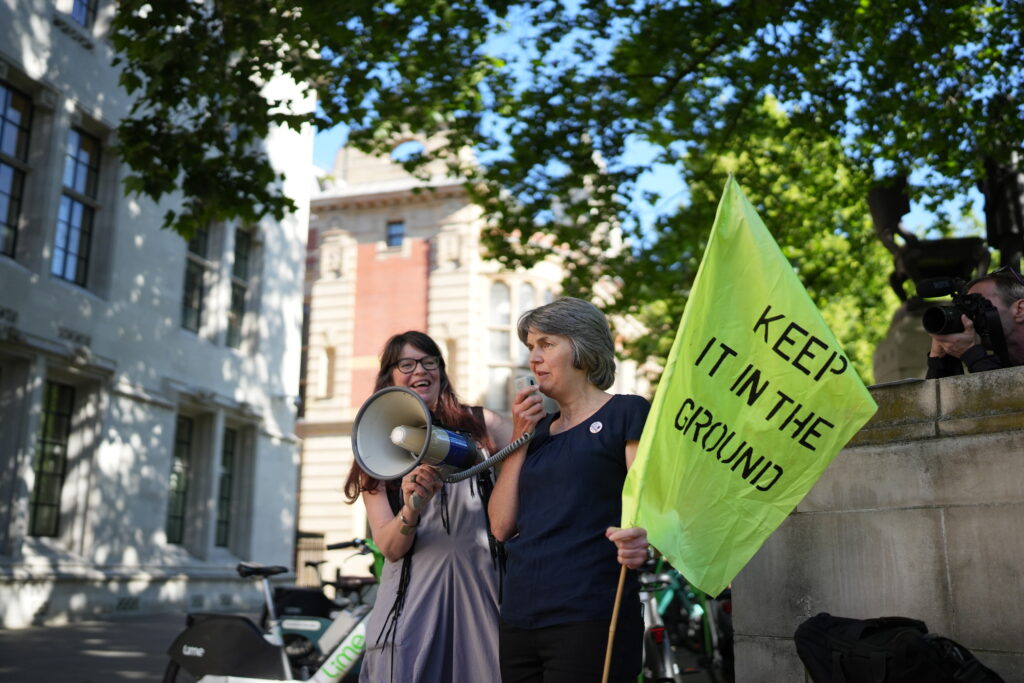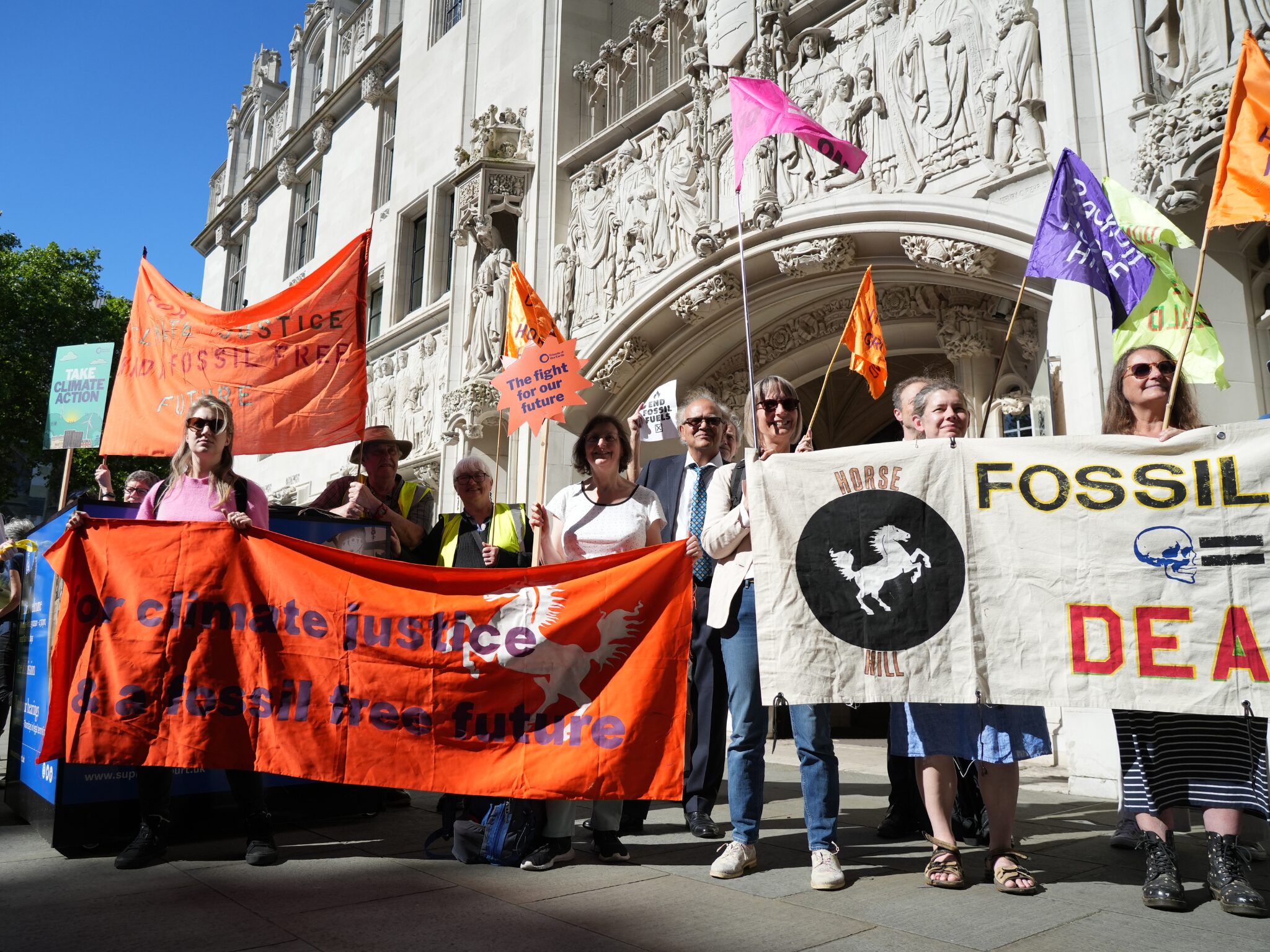UK Supreme Court Puts Future Fossil Fuel Projects in Jeopardy After Landmark Ruling
5 Mins Read
The UK’s supreme court has ruled that the climate implications of fossil fuels must be taken into account by planning bodies, throwing new projects in doubt.
Future fossil fuel extraction projects in the UK are in jeopardy, thanks to a landmark ruling by the supreme court, which has declared that the full environmental impact of oil, gas and coal must be considered in planning applications.
The judgement sets a crucial precedent in whether the downstream or scope 3 emissions of a fossil fuel project – which include the emissions from using or burning these fuels, not just extracting them – should be taken into account.
The case relates to an oil drilling project at Horse Hill in Surrey, whose planning permission was extended by the local council in 2019. It was initiated by campaigner Sarah Finch (on behalf of the Weald Action Group), who challenged the decision and argued it should have accounted for the full scope of greenhouse gas emissions.
While she lost in the high court and the court of appeal, the supreme court in London ruled in her favour in a narrow three-to-two majority, quashing the planning approval as unlawful.
“The whole purpose of extracting fossil fuels is to make hydrocarbons available for combustion,” the court’s judgement read. “It can therefore be said with virtual certainty that, once oil has been extracted from the ground, the carbon contained within it will sooner or later be released into the atmosphere as carbon dioxide and so will contribute to global warming.”
A big win for the climate

The Surrey County Council’s permission allowed Horse Hill Developments (partly owned by UK Oil & Gas), to retain two oil wells and drill four more over 20 years near Horley, a town close to Gatwick.
Although an Environmental Impact Assessment for the project analysed the effect of the construction, production and decommissioning of the site, it didn’t examine the impact from the use of the oil. The six wells are expected to produce 3.3 million tonnes of crude oil over the 20-year period – the process of digging it from the ground would lead to 140,000 tonnes of emissions, but burning the fuel would produce more than 10 million tonnes of CO2e, according to climate campaign group Friends of the Earth.
Lord Leggatt, giving the majority judgement, said: “I do not accept the premise that it would be wrong for a local planning authority, in deciding whether to grant planning permission, to take into account the fact that the proposed use of the land is one that will contribute to global warming through fossil fuel extraction.”
The UK’s Climate Change Committee has emphasised the need to embed climate considerations in planning decisions, outlining that fossil fuel production is not in line with its net-zero goal of 2050.
“It is not disputed that these emissions, which can easily be quantified, will have a significant impact on climate,” said Leggatt, after overruling the lower courts’ decisions. “The only issue is whether the combustion emissions are effects of the project at all. It seems to me plain that they are.”
Finch said she was “absolutely over the moon” with the victory. “The Weald Action Group has always believed it was wrong to allow oil production without assessing its full climate impacts, and the Supreme Court has shown we were right,” she said.
“This is a welcome step towards a safer, fairer future,” added Finch. “The oil and gas companies may act like business-as-usual is still an option, but it will be very hard for planning authorities to permit new fossil fuel developments – in the Weald, the North Sea or anywhere else – when their true climate impact is clear for all to see.”
‘The beginning of the end’

The supreme court judges didn’t rule that Surrey County Council should reject new oil well proposals, but that it should have considered the downstream emissions. It also doesn’t prevent public bodies from approving projects with major climate impacts, but it bolsters their case for refusal. The ruling throws the future of fossil fuel projects into uncertainty.
“This judgment will make it harder for new fossil fuel projects to go ahead. They can no longer claim that downstream emissions are someone else’s problem,” said Friends of the Earth lawyer Katie de Kauwe, who called the judgement a “watershed moment”. “It is a huge boost to everyone involved in resisting fossil fuel projects.”
She added: “Gas, oil and coal companies have been fighting tooth and nail to avoid having to account for all the climate-harming emissions their developments cause. Now, the highest court in the country has ruled that planning permission for an oil project was granted unlawfully because there was no consideration of its full climate impact.”
Stephen Sanderson, CEO of UKOG, called the court’s ruling “rather perplexing”, while the Surrey City Council said planning permission for the oil well “remains to be determined in due course”. The ruling could have immediate implications for other controversial schemes, including a new coal mine in Whitehaven, Cumbria (which had been delayed pending the Horse Hill decision), as well as the Rosebank and Jackdaw oil and gas projects in the North Sea.
“It is extremely difficult to overstate the significance of this case,” said Sam Fowles, planning and environment law specialist at Cornerstone Barristers. “This case could be the beginning of the end of new fossil fuel extraction in the UK.”
The International Energy Agency has said no new oil and gas exploration should happen if we are to limit global temperatures to 1.5°C above pre-industrial levels. The UK supreme court’s judgement cited the UNEP’s findings that the world’s governments plan to produce more than twice the amount of fossil fuels in 2030 than would be consistent with the goals outlined in the Paris Agreement.
“The reports also examine national policies, plans and projections in key countries (including the UK). The general picture is that many governments continue to support, finance, and expand fossil fuel production, even though such policies are irreconcilable with global climate commitments,” the court said.
The decision comes two weeks before the UK’s general election – polls show the Labour party is on track to form a government for the first time in 14 years. And last month, it emerged that the governing Conservative party has received £8.4M in donations from fossil fuel interests and climate deniers since the last election in 2019.



